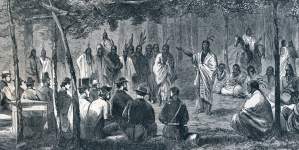The Hancock-Custer Campaign against the Native Americans of the northern plains obstructing the construction of the transcontinental railroad and emigration west had been an ineffective failure. Changing tactics, the United States Congress authorized the formation of an Indian Peace Commission to negotiate treaties with the Sioux, Cheyenne, Kiowa, and their allied tribes. On this day, at Medicine Lodge River in Kansas, a traditional Native American meeting site, two treaties were signed that achieved the goal of moving the reservations allowed to various tribes. The first agreement was between representatives of the Kiowa and Comanche nations and the second with the Kiowa-Plains Apache. The agreements were immediately controversial and were contested for decades in United States federal courts. (By John Osborne)
Stan Hoig, The Battle of the Washita: The Sheridan-Custer Indian Campaign of 1867-1869 (Lincoln, NE; University of Nebraska Press, 1976), 29-31.
"The Indian Peace Treaty," Harper's Weekly Magazine, November 16, 1867, p. 725.





